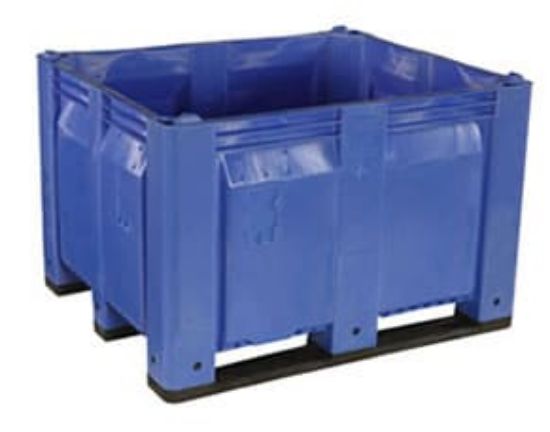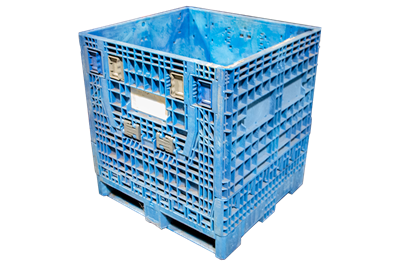Why Mass Containers Are Vital for Sustainable and Affordable Transport
Mass containers play a crucial duty in modern logistics. They assist in the effective activity of big amounts of products, therefore optimizing transport procedures. This approach not just minimizes expenses yet also minimizes environmental influence via reduced exhausts and waste generation. As markets look for even more sustainable techniques, the adoption of mass containers is becoming significantly substantial. What effects does this shift hold for future logistics and supply chain monitoring?

The Advantages of Making Use Of Bulk Containers in Logistics
Mass containers revolutionize logistics by enhancing efficiency and sustainability. These containers permit the transport of big quantities of products in a single trip, considerably decreasing the number of journeys needed. This not only improves operations yet additionally decreases labor prices connected with handling, packing, and unloading. In addition, mass containers are made to maximize area usage within transport lorries, making certain that even more items can be delivered all at once.
The standardization of mass containers also streamlines the logistics procedure. With uniform dimensions, they can be quickly stacked and stored, resulting in enhanced warehouse administration. Bulk containers commonly feature sturdy materials that protect materials from damage during transportation, thereby reducing item loss and boosting overall integrity. Therefore, organizations can experience improved supply chain efficiency, ultimately causing increased earnings and consumer contentment. This combination of variables makes bulk containers an essential asset in contemporary logistics.
Environmental Effect: Reducing Waste and Carbon Footprint
As sectors increasingly prioritize sustainability, the fostering of mass containers has become a vital technique for reducing waste and lowering carbon footprints. These containers lessen making use of packaging products, such as boxes and plastic, consequently especially decreasing general waste generation. By settling deliveries, mass containers enhance transportation efficiency, permitting even more items to be transported per trip. This reduction in trips directly associates with reduced greenhouse gas discharges, adding to a smaller sized carbon impact.
Moreover, mass containers can frequently be reused or recycled, even more mitigating ecological influence. The longevity of these containers guarantees they can withstand multiple transport cycles, minimizing the need for single-use alternatives. used plastic containers. By simplifying logistics and promoting effective resource use, bulk containers not only sustain lasting techniques but also encourage industries to straighten with international ecological objectives. Eventually, their implementation reflects a dedication to eco-friendly stewardship and liable source administration
Cost Savings: Just How Mass Containers Lower Transportation Expenses
While many business look for ways to boost their lower line, making use of bulk containers presents a substantial chance for reducing transport costs. Bulk containers make the most of the quantity of goods moved, enabling companies to deliver larger amounts simultaneously. This efficiency decreases the variety of trips called for, directly lowering fuel prices and lessening labor expenses related to loading and unloading.
Additionally, mass containers often include streamlined designs that enhance space application within transport vehicles. This indicates fewer empty rooms, resulting in much more reliable use of readily available capacity. The longevity of bulk containers can decrease the risk of item damage throughout transportation, making certain and lowering losses that even more products show up undamaged.
Enhancing Supply Chain Efficiency With Bulk Storage Space Solutions
Bulk storage services play a crucial function in boosting supply chain efficiency by enhancing stock administration. By settling goods into fewer, bigger containers, organizations can greatly decrease managing prices connected with constant transfers and handling. This streamlined approach allows for much better tracking and management of inventory, ultimately causing boosted functional efficiency.
Structured Stock Administration
Efficient stock administration is necessary for optimizing supply chain procedures, especially when companies embrace bulk storage services. These remedies make it possible for organizations to maintain higher stock degrees while minimizing the frequency of replenishment. By consolidating materials right into mass containers, firms can improve their inventory processes, reducing the intricacy linked with tracking numerous smaller packages. This approach facilitates exact inventory matters and enhances forecasting precision, permitting more informed decision-making. Furthermore, mass storage remedies streamline storehouse organization, making it easier to situate and gain access to products when required. Consequently, organizations can achieve a more reliable supply turnover price, eventually boosting overall supply chain efficiency and lowering the possibility of stockouts or overstock scenarios.

Lowered Handling Costs
The execution of bulk storage solutions not only enhances inventory management yet also significantly lowers dealing with prices throughout the supply chain. By consolidating materials into mass containers, firms decrease the requirement for constant handling and transfer between different storage space and transportation systems. This strategy cuts down on labor prices related to loading, dumping, and moving smaller bundles. In addition, bulk storage minimizes the regularity of shipments, causing reduced transport expenses and decreased gas intake. Because of this, services can enhance their logistics procedures, enabling for a much more effective allotment of resources. Ultimately, decreased dealing with costs add to boosted total supply chain performance, promoting an atmosphere that supports both sustainability and economic practicality.

Versatility of Bulk Containers Throughout Numerous Industries
Many industries have distinct demands for transport and storage space, mass containers have actually arised as a versatile service that satisfies a large array of demands. These containers, varying from huge containers to specialized containers, can accommodate diverse products, consisting of powders, liquids, and granules. In the agricultural industry, mass containers help with the transportation of grains and fertilizers, while the food and beverage industry utilizes them for ingredients and finished items. The chemical sector depends on mass containers for securely transferring unsafe materials, making sure compliance with security laws. Furthermore, building and construction firms profit from mass containers for moving aggregates and other products. Their flexibility reaches different settings of transportation, including ships, trains, and vehicles, improving logistical efficiency. This versatility not only enhances procedures throughout different industries however also promotes sustainability by decreasing packaging waste and enhancing space en route. Mass containers play a necessary duty in modern supply chain management.
Future Patterns wholesale Container Use and Sustainability
The future of mass container use is significantly formed by cutting-edge products growth that boosts sustainability. In addition, automation in logistics assures to simplify procedures, lowering waste and enhancing effectiveness. Embracing circular economy practices will further reinvent how bulk containers are made, used, and reused, fostering a much more sustainable transport landscape.
Ingenious Materials Advancement
As sectors increasingly prioritize sustainability, cutting-edge materials advancement in mass containers emerges as a substantial consider improving green transportation services. Manufacturers and researchers are exploring naturally degradable plastics, recycled compounds, and light-weight steels to decrease ecological impact. These products not just reduce waste yet also enhance gas effectiveness by reducing the overall weight of containers. Additionally, improvements in clever products, which can adjust to differing problems, enhance the resilience and performance of mass containers. The combination of these innovative materials lines up with round economic situation concepts, advertising reuse and recycling. As the need for lasting methods expands, the advancement of such materials will play an important function in shaping the future of bulk container usage in logistics and transportation.
Automation in Logistics
Significant advancements in automation are poised to transform logistics and the utilization of mass containers, enhancing sustainability in transport. Automated systems, consisting of drones and independent automobiles, are enhancing the motion of bulk containers, decreasing the reliance on traditional fuel-powered transportation. These innovations enhance routing and packing processes, reducing empty miles and boosting fuel performance. Additionally, automated inventory monitoring systems boost tracking and monitoring of mass containers, making sure much better resource appropriation and minimized waste. The combination of the Net of Points (IoT) enables real-time data evaluation, allowing proactive decision-making that lines up with sustainability goals. As automation remains to develop, it is expected to drive additionally developments wholesale container usage, inevitably supporting even more sustainable logistics methods and decreasing the environmental effect of transportation.
Round Economy Practices
Innovations in automation are establishing the stage for an extra integrated strategy to circular economic situation practices in the domain name of bulk container usage. As sectors progressively welcome sustainability, mass containers are being designed for durability and reusability. This change not only decreases waste but additionally improves source effectiveness. Companies are taking on techniques such as closed-loop systems, where used containers are accumulated, refurbished, and reintroduced right into the supply chain. Furthermore, wise modern technologies track container life cycles, promoting better management and lowering environmental impact. The partnership in between producers, logistics service providers, and end-users is crucial in establishing criteria for sustainable container use. used collapsible bulk containers. Future patterns show an expanding focus on materials that are eco-friendly and recyclable, more reinforcing the round economy's concepts in mass transportation

Frequently Asked Inquiries
What Materials Are Mass Containers Typically Made From?
Mass containers are generally constructed from long lasting materials such as high-density polyethylene, cardboard, steel, and light weight aluminum. These products provide protection, stamina, and convenience, making them ideal for transferring different items in various industries effectively.
Just how Do I Pick the Right Size Mass Container?
Picking the appropriate size bulk container includes examining the quantity of refurbished bulk containers products to be transferred, thinking about managing tools compatibility, and evaluating storage space requirements. Appropriate dimension warranties performance in transport and minimizes waste during shipment.
Are Bulk Containers Reusable or Recyclable?
Bulk containers are frequently recyclable, developed for several trips, improving sustainability. Several can additionally be reused, relying on the products made use of. Picking recyclable alternatives better sustains ecological goals and minimizes waste in transportation practices.
What Safety Rules Relate To Mass Container Transportation?
Security regulations for bulk container transport consist of compliance with the Department of Transport standards, proper labeling of dangerous products, architectural honesty assessments, and adherence to weight limits to ensure risk-free handling and stop crashes throughout transportation.
How Can Companies Shift to Using Bulk Containers Effectively?
Services can alter to bulk containers by examining present logistics, educating personnel on handling, purchasing ideal equipment, maximizing stock administration, and collaborating with distributors to ensure compatibility and effectiveness throughout the supply chain.
As industries increasingly prioritize sustainability, the fostering of mass containers has actually emerged as a vital method for reducing waste and reducing carbon impacts. By settling products right into mass containers, business can streamline their supply procedures, minimizing the complexity associated with tracking numerous smaller sized bundles. As industries increasingly focus on sustainability, cutting-edge products advancement in bulk containers emerges as a considerable variable in boosting green transport remedies. Automated systems, consisting of drones and independent cars, are streamlining the activity of bulk containers, reducing the dependence on traditional fuel-powered transport. Additionally, automated stock administration systems boost monitoring and tracking of bulk containers, guaranteeing much better resource allowance and decreased waste.